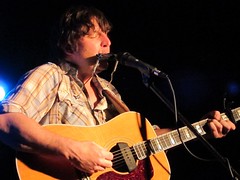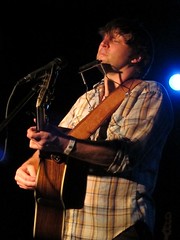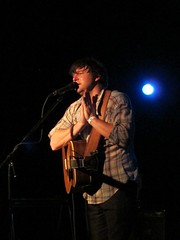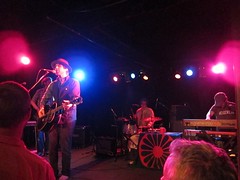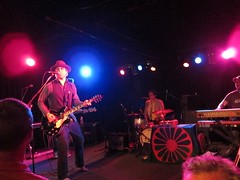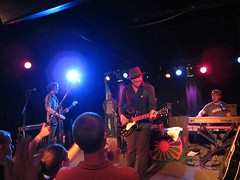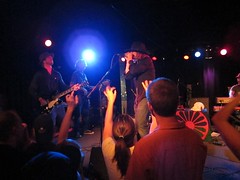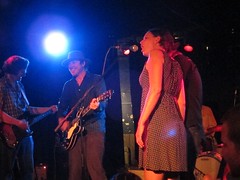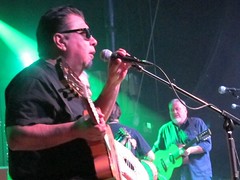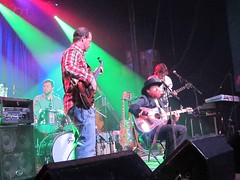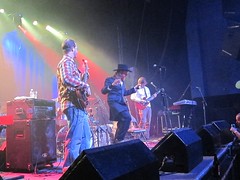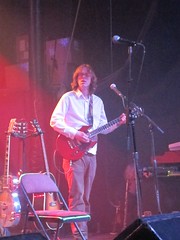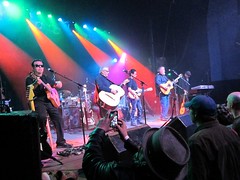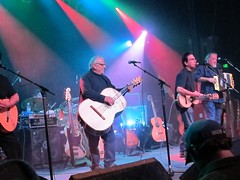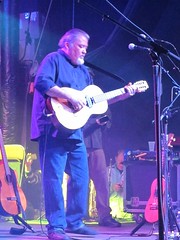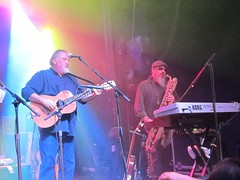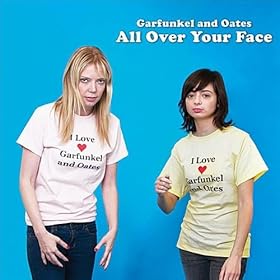30 April 2015 (Baur's Listening Lounge, Denver CO)
4.0/5.0



Baur's Listening Lounge is a new venue on the Denver music scene. It's a stylish bar and restaurant in the heart of downtown Denver with music events hosted by the non-profit Music Appreciation Society. The M/A/S is focused on quality acoustic performances across genres. Aside from sponsoring Bethany and Rufus, they have a diverse selection of shows coming up, ranging from Brazilian jazz to chamber music. They aim to create a respectful, concert hall experience; the venue's intimate space encourages a greater sense of immediacy and connection. That worked fairly well for this show, but the lounge atmosphere meant that there was more conversation and distraction out at the edges of the room. The host, David Spira, tried with mixed success to keep that under control, but, fortunately, Bethany and the other musicians were captivating enough to overcome the mild commotion.

Call it chemistry or magic, it's a beautiful thing when people come together to form a greater whole. Rufus Cappadocia carries on a cellist's tradition of expanding the role of his instrument. Where Zoe Keating turned towards looping to create layered masterpieces, Cappadocia takes the instrument out of the classical chamber and engages with the exotic sounds of North Africa and other global sources. He has an incredible ear and phenomenal technical proficiency. Bethany Yarrow grew up immersed in American folk and spiritual music, but she's built on that foundation to find musical connections that reach across the world. She has the vocal strength of a young Joan Baez, but she often taps into a soulful expressiveness that takes it to another level. The two find common ground with their global ear for music and they complement each other in how they internalize the rhythms and tones, whether through dance or flamboyant playing.

Bethany and Rufus have a new album coming out, Trouble in the Land, recorded with their Roots Quartet. The bad news is that this tour did not include flutist Yacouba Moumouni or percussionist Bonga Jean-Babtiste, so we missed out on the full band experience heard on their Soundcloud page. It was hard to feel too bad about this, though, because they had added a touring musician, Brahim Fribgane, who filled out the arrangements adroitly on cajón (box drum). Fribgane's playing was full of syncopated rhythm, but he also occasionally provided melodic accompaniment on the oud.
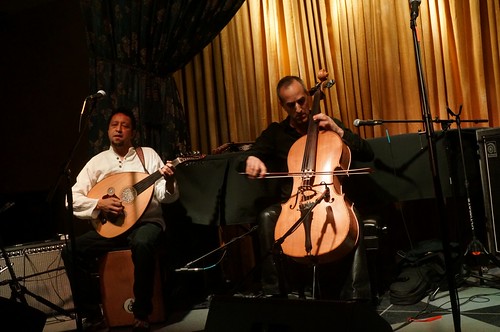
For lack of a better pigeonhole, Bethany and Rufus could be called folk musicians, they drew on that connection with their opening song, a rendition of the Civil Rights anthem "Ain't Gonna Let Nobody Turn Me Around". In classic folk style, Yarrow pulled the crowd in to sing along, but this version was a joyful funk jam. That funk feel continued into "900 Miles". Cappadocia picked out a busy bass line on his cello while Yarrow soulfully coiled around the lyrics, letting the song build up a sizzling heat. When Fribgane came in, his drumming pushed it into a full-on danceable groove.

The funky R&B was a good way to get the crowd warmed up, but by the time they got to their reworked version of "This Train", the North African influence on their music was undeniable. Cappadocia switched over to a unique quartet-tone baritone guitar that combined a pair of bass strings with two higher pitched twin strings, like the courses on a twelve string guitar or mandolin, while Fribgane played the oud. The restless polyrhythmic beat and the semi-tone melodies from the fretless oud reminded me a lot of the Malian blues that Ali Farka Touré used to play. Where a lot of arrangements for this song might rely on percussion to create a train wheel rhythm, Cappadocia and Fribgane set up repeated riffs that rolled like waves through the tune. Even without the oud, that North African sound resurfaced throughout the set.

After a brief intermission, the band came back for a second set that showed a very different side. The rhythms were more Latin and the songs rooted in those cultures rather than the American folk tradition. The centerpiece was a three song series, all associated with the Brazilian "Queen of the Forest", Juriama (sp?). Yarrow explained the mythology and put the songs in context, which seemed steeped in a kind of animism. The spirituality came across as a bit New Age, but most of the audience was receptive and the music overcame everyone else's reservations. Where the first set had been moody and soulful, these tunes were much more upbeat, and Yarrow danced ecstatically during the instrumental sections.

Bethany and Rufus are well matched as a duo and this show captured both their strengths. Yarrow's naturally open stage presence made her the friendly face of the band, while Cappadocia's wide-ranging technical prowess, from percussive tapping that suggests Les Claypool to tightly looped flurries, gave the music depth and complexity. It was great performance anchored in heart, rhythm, and soul.

More photos on my Flickr.
4.0/5.0




Baur's Listening Lounge is a new venue on the Denver music scene. It's a stylish bar and restaurant in the heart of downtown Denver with music events hosted by the non-profit Music Appreciation Society. The M/A/S is focused on quality acoustic performances across genres. Aside from sponsoring Bethany and Rufus, they have a diverse selection of shows coming up, ranging from Brazilian jazz to chamber music. They aim to create a respectful, concert hall experience; the venue's intimate space encourages a greater sense of immediacy and connection. That worked fairly well for this show, but the lounge atmosphere meant that there was more conversation and distraction out at the edges of the room. The host, David Spira, tried with mixed success to keep that under control, but, fortunately, Bethany and the other musicians were captivating enough to overcome the mild commotion.

Call it chemistry or magic, it's a beautiful thing when people come together to form a greater whole. Rufus Cappadocia carries on a cellist's tradition of expanding the role of his instrument. Where Zoe Keating turned towards looping to create layered masterpieces, Cappadocia takes the instrument out of the classical chamber and engages with the exotic sounds of North Africa and other global sources. He has an incredible ear and phenomenal technical proficiency. Bethany Yarrow grew up immersed in American folk and spiritual music, but she's built on that foundation to find musical connections that reach across the world. She has the vocal strength of a young Joan Baez, but she often taps into a soulful expressiveness that takes it to another level. The two find common ground with their global ear for music and they complement each other in how they internalize the rhythms and tones, whether through dance or flamboyant playing.

Bethany and Rufus have a new album coming out, Trouble in the Land, recorded with their Roots Quartet. The bad news is that this tour did not include flutist Yacouba Moumouni or percussionist Bonga Jean-Babtiste, so we missed out on the full band experience heard on their Soundcloud page. It was hard to feel too bad about this, though, because they had added a touring musician, Brahim Fribgane, who filled out the arrangements adroitly on cajón (box drum). Fribgane's playing was full of syncopated rhythm, but he also occasionally provided melodic accompaniment on the oud.

For lack of a better pigeonhole, Bethany and Rufus could be called folk musicians, they drew on that connection with their opening song, a rendition of the Civil Rights anthem "Ain't Gonna Let Nobody Turn Me Around". In classic folk style, Yarrow pulled the crowd in to sing along, but this version was a joyful funk jam. That funk feel continued into "900 Miles". Cappadocia picked out a busy bass line on his cello while Yarrow soulfully coiled around the lyrics, letting the song build up a sizzling heat. When Fribgane came in, his drumming pushed it into a full-on danceable groove.

The funky R&B was a good way to get the crowd warmed up, but by the time they got to their reworked version of "This Train", the North African influence on their music was undeniable. Cappadocia switched over to a unique quartet-tone baritone guitar that combined a pair of bass strings with two higher pitched twin strings, like the courses on a twelve string guitar or mandolin, while Fribgane played the oud. The restless polyrhythmic beat and the semi-tone melodies from the fretless oud reminded me a lot of the Malian blues that Ali Farka Touré used to play. Where a lot of arrangements for this song might rely on percussion to create a train wheel rhythm, Cappadocia and Fribgane set up repeated riffs that rolled like waves through the tune. Even without the oud, that North African sound resurfaced throughout the set.

After a brief intermission, the band came back for a second set that showed a very different side. The rhythms were more Latin and the songs rooted in those cultures rather than the American folk tradition. The centerpiece was a three song series, all associated with the Brazilian "Queen of the Forest", Juriama (sp?). Yarrow explained the mythology and put the songs in context, which seemed steeped in a kind of animism. The spirituality came across as a bit New Age, but most of the audience was receptive and the music overcame everyone else's reservations. Where the first set had been moody and soulful, these tunes were much more upbeat, and Yarrow danced ecstatically during the instrumental sections.

Bethany and Rufus are well matched as a duo and this show captured both their strengths. Yarrow's naturally open stage presence made her the friendly face of the band, while Cappadocia's wide-ranging technical prowess, from percussive tapping that suggests Les Claypool to tightly looped flurries, gave the music depth and complexity. It was great performance anchored in heart, rhythm, and soul.

More photos on my Flickr.

 Few things are more direct and personal than a solo singer with his folk guitar. Everything is in plain sight and there’s little cover for emotional vulnerability. Traditional singer/songwriters like Nancy Griffith, Todd Snider, and Billy Bragg each offer different paths to entertainment, with sincerity and flashes of humor, but they all share an openness that grounds their music and touches audiences. On the surface,
Few things are more direct and personal than a solo singer with his folk guitar. Everything is in plain sight and there’s little cover for emotional vulnerability. Traditional singer/songwriters like Nancy Griffith, Todd Snider, and Billy Bragg each offer different paths to entertainment, with sincerity and flashes of humor, but they all share an openness that grounds their music and touches audiences. On the surface,  I can’t separate The Charity of Night from a thick, smoky Amsterdam evening at the Melkweg in March of 1997. After a day wandering through museums, bars and coffee shops, my friend insisted on catching
I can’t separate The Charity of Night from a thick, smoky Amsterdam evening at the Melkweg in March of 1997. After a day wandering through museums, bars and coffee shops, my friend insisted on catching  Gogol Bordello doesn't so much march to the beat of a different drummer as dance to the rhythm of a crazy-quilt amalgam of percussion traditions. Starting from founder Eugene Hütz's Gypsy-Ukrainian roots, they've incorporated the ska-tinted punk of The Clash along with elements of jazz and rock and roll. Over time, the band has defied assimilation by absorbing every shiny musical tradition that catches their ear. So far, the Gypsy character still dominates by virtue of Hütz's thick accent and the exotic siren sound of minor key melodies. Moving beyond their loud, thrashy beginnings, their more recent albums, like 2010’s Trans-Continental Hustle, feature more studio polish as they evolve their sound. Pura Vida Conspiracy continues that direction, incorporating influences ranging from Latin rhythms to classic American country. Just as the Clash built on their punk foundation as they matured, Gogol Bordello holds on to their principles while following their muse.
Gogol Bordello doesn't so much march to the beat of a different drummer as dance to the rhythm of a crazy-quilt amalgam of percussion traditions. Starting from founder Eugene Hütz's Gypsy-Ukrainian roots, they've incorporated the ska-tinted punk of The Clash along with elements of jazz and rock and roll. Over time, the band has defied assimilation by absorbing every shiny musical tradition that catches their ear. So far, the Gypsy character still dominates by virtue of Hütz's thick accent and the exotic siren sound of minor key melodies. Moving beyond their loud, thrashy beginnings, their more recent albums, like 2010’s Trans-Continental Hustle, feature more studio polish as they evolve their sound. Pura Vida Conspiracy continues that direction, incorporating influences ranging from Latin rhythms to classic American country. Just as the Clash built on their punk foundation as they matured, Gogol Bordello holds on to their principles while following their muse.

